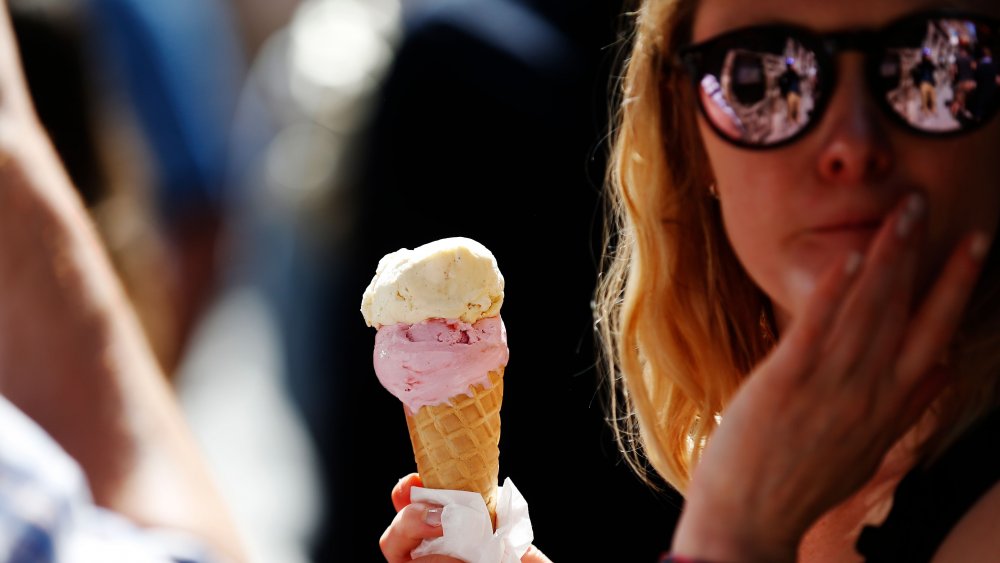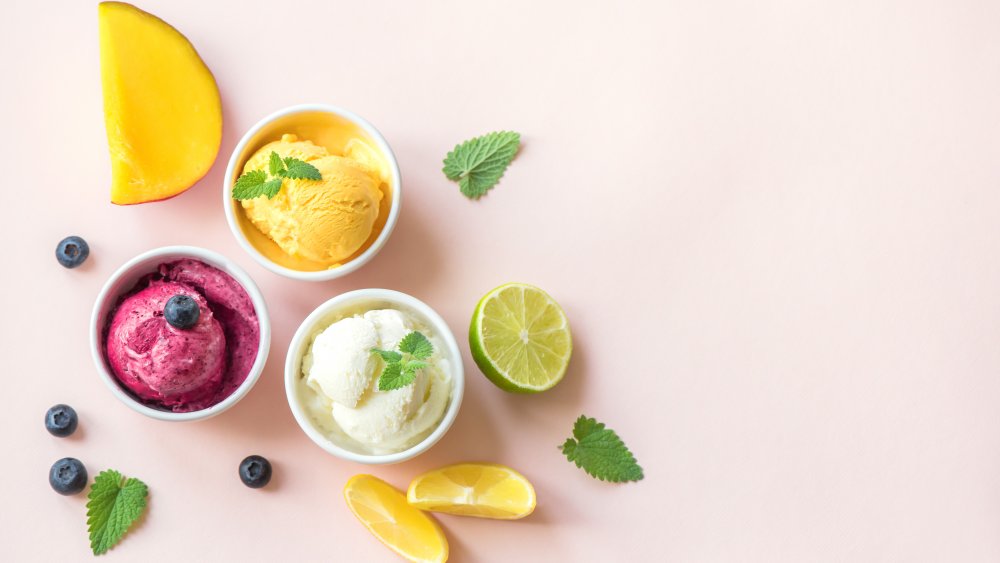Why You Should Avoid Overindulging In Ice Cream Right Now
Avoid ice cream? Say it ain't so! Winter or summer, rain or shine, triumph or tragedy, everybody knows a girl's true best friend isn't diamonds, it's Ben and Jerry's. Not that men don't enjoy it either, along with Haagen-Dazs, Baskin-Robbins, Dairy Queen... the only bad ice cream is no ice cream at all.
Especially now, when life just hasn't been the same since... well, we can't even remember when. Even a few months ago seems like ancient history as we adjust to the fact that the "new normal" seems to mean nothing will ever be normal ever again, and we're all going to need an extra scoop of sweet, creamy deliciousness to help us hang in there. Forget Taco Tuesday, times like these seem to call for making every day Sundae Funday, and it would be no surprise if even the premium ice cream brands abandoned making cute little pint-sized containers in favor of gallon buckets. And yet, wouldn't you know, there's always someone trying to spoil things.
The ice cream-demonizing internet rumor
Throughout the duration of the pandemic thus far (all endless two months and counting), the internet has been rife with rumors regarding how the virus spreads and how it can be avoided. Much of this so-called information ranges from the dubious to the downright dangerous, since there are no circumstances, ever, under which drinking bleach could be considered a healthy thing to do (and the same goes for cocaine).
Lately there's been a rumor making the rounds that eating ice cream or other frozen foods or even cold drinks (including milkshakes! Nooo, not the Frostys, too!) could increase your chances of catching coronavirus. This rumor, which purports to be advice from Unicef Cambodia (an organization which vehemently denied any involvement), seems to be based on the idea that heat could possibly destroy the virus. By some stretch of logic, the anonymous trolls behind the rumor distorted this to mean that consuming anything cold that might lower your body temperature should be avoided at all costs.
The rumor, debunked
Unicef Cambodia was anything but pleased to be linked to this rumor, tweeting: "Misinformation about pandemics can cause somebody's life. Please take this issue seriously, stay informed and do not fall prey to fake news." Charlotte Gornitzka, a woman who is currently working for Unicef to combat coronavirus misinformation, said in a press release for UNICEF that the rumor attributing coronavirus risk to cold food consumption is "of course wholly untrue." Though we're not exactly sure at this point just how heat does or does not affect the virus, Professor Sally Bloomfield, at the London School of Hygiene and Tropical Medicine, revealed to BBC that the temperature of foods or liquids you consume won't affect your body temperature and that once the virus is inside your body (which it won't do by way of your food), there is nothing you can eat or drink that will help to fight it off.
The Harvard Health Blog published by Harvard Medical School cautioned that the rumor about ice cream causing coronavirus has also been linked to a years-old video about avoiding infection through diet modification, a video that has nothing whatsoever to do with the current virus and one that they describe as "useless." The final word on the rumor, however, comes from the World Health Organization, clearinghouse for all COVID-19 info throughout the pandemic: "Fact: There is no scientific evidence that eating hygienically made frozen food and ice cream spreads the new coronavirus."
You don't have to avoid ice cream, just overindulgence
Okay, now for some (semi) bad news, although it's really not much of a scoop to reveal that your standard deliciously sugar-laden ice cream is not exactly the healthiest food you could be consuming on a daily basis. That's because, according to Sydney Greene, MS, RD, ice cream's two main ingredients — dairy and sugar — come together for a combo that causes inflammation in the body. When inflammation is high, "it taxes the immune system leaving us more susceptible to disease and illness," Greene explained to Eat This, Not That! "Processed foods, with their high sugar levels, omega-6 fatty acids, excess sodium, and junky additives can stoke the fire of inflammation," Greene continued, while Ashley Kitchens MPH, RD, LDN, added, "Dairy products such as cheese and full-fat cow's milk contain saturated fat, which can increase inflammation. Saturated fat can also raise your bad cholesterol and put you at higher risk for heart disease."
But are people heeding this warning? The latest numbers say no. Food Navigator reports consumption of ice cream has been way up over the past few weeks, with Americans downing over 30 percent more of this sweet substance than in pre-quarantine days. Dr. James Richardson, a cultural anthropologist now working as a business analyst, attributes this rise in demand to emotional eating (surprise, surprise), what with millions of people suddenly having lost their jobs among all the other stresses of living through a pandemic.
Bottom line: It's probably never a great idea to overindulge in ice cream on the daily, but especially during pandemic times when we're all trying to keep our immune systems super healthy, it might be an even worse idea.



